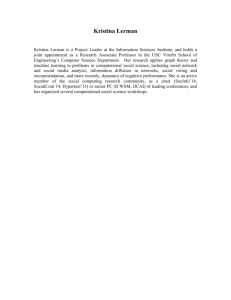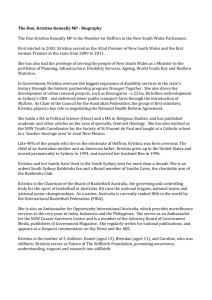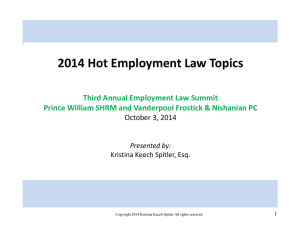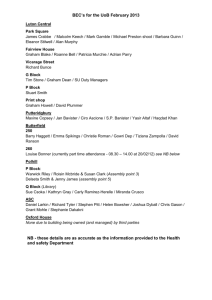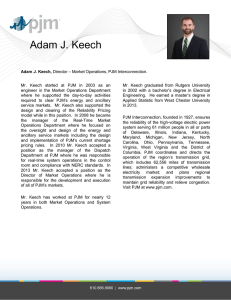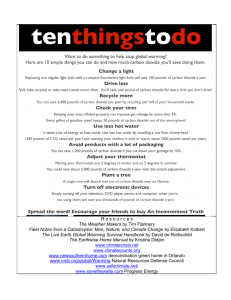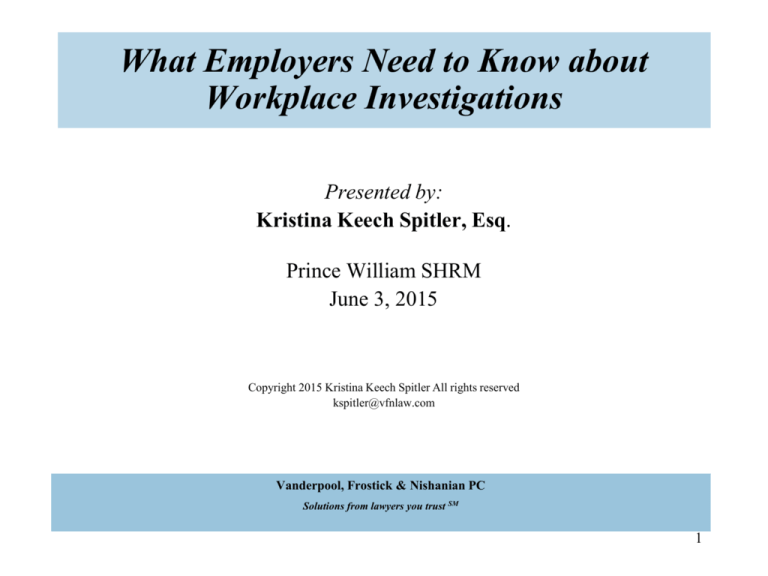
What Employers Need to Know about
Workplace Investigations
Presented by:
Kristina Keech Spitler, Esq.
Prince William SHRM
June 3, 2015
Copyright 2015 Kristina Keech Spitler All rights reserved
kspitler@vfnlaw.com
Vanderpool, Frostick & Nishanian PC
Solutions from lawyers you trust SM
1
DISCLAIMER
This presentation and information is designed to provide general information, is not intended to
constitute legal advice and should not be utilized as a substitute for professional services in specific
situations. If legal advice or other expert assistance is required, the services of a professional should
be sought.
Copyright 2015 Kristina Keech Spitler. All rights reserved.
2
Kristina Keech Spitler, Esq.
Kristina Keech Spitler, Esq. is a shareholder with the law firm, Vanderpool, Frostick &
Nishanian, P.C., where she represents and advises businesses on business and employment issues
and litigation including representing employers in court, in mediation, and before administrative
agencies such as EEOC, assisting clients comply with laws on such issues as discrimination,
disabilities and accommodations, wage and hour, leave, hiring and firing , and discipline. In
addition, her practice includes drafting and updating handbooks and policies, providing
management and employee training, performing internal investigations, and counseling on
matters relating to breach of agreements, non-competes and restrictive covenant agreements. Ms.
Spitler is a highly rated speaker and trainer on employment law issues.
Ms. Spitler has been recognized as one of one of Virginia’s “Most Influential Women” by
Virginia Lawyers Media and as one of Virginia’s “Legal Elite” in Labor/Employment Law by
Virginia Business Magazine.
Contact Ms. Spitler at kspitler@vfnlaw.com or (703) 369-4738.
Copyright 2015 Kristina Keech Spitler. All rights reserved.
3
Duty to Investigate
Under Burlington Industries, Inc. v. Ellerth, 118 S. Ct.
2257 (1998), and Faragher v. City of Boca Raton, 118 S. Ct.
2275 (1998), an employer can be held vicariously liable for
the acts of its supervisors. However, employers have an
affirmative defense where it can show that it exercised
reasonable care to prevent and promptly correct any harassing
behavior and the employee unreasonably failed to take
advantage of any preventative or corrective opportunities
provided by the employer or to avoid harm otherwise.
Copyright 2015 Kristina Keech Spitler. All rights reserved.
4
Duty to Investigation
The employer must determine whether the alleged
misconduct is related to or potentially related to
discrimination based upon a protected status.
Fact finding investigation must be promptly instigated.
Copyright 2015 Kristina Keech Spitler. All rights reserved.
5
Duty to Investigate
• The employer still has a duty to investigate even if the
complainant does not request action or requests that the
employer take no action against the alleged harasser.
Hardage v. CBS Broad. Inc., 427 F.3d 1177, 1191 (9th Cir.
Wash. 2005).
• The employer has a duty to investigate even if the
complainant offers no specific details of the alleged
harassment.
Copyright 2015 Kristina Keech Spitler. All rights reserved.
6
Duty to Investigate
Employers have a duty to investigate even if they do
not have actual knowledge of harassment, as an employer can
be liable if it should have known of the conduct and it failed
to take immediate and corrective action.
Copyright 2015 Kristina Keech Spitler. All rights reserved.
7
Investigation
1. Ensure Harassment Stops
2. Select an Investigator
3. Conduct Interviews
4. Assess Credibility
5. Ensure Investigation is Complete
6. Make a Determination
Copyright 2015 Kristina Keech Spitler. All rights reserved.
8
Ensure Harassment Stops
The employer should inform both the complainant and the
alleged harasser that it will take immediate and appropriate
corrective action, including discipline.
If necessary, separate the parties:
• Transfer the alleged harasser, change the alleged harasser’s
schedule, or place the alleged harasser on leave with pay.
• Do NOT transfer the complainant, involuntarily change the
complainant’s schedule, or place the complainant on leave, or
burden the complainant as these actions could be viewed as
retaliation.
Copyright 2015 Kristina Keech Spitler. All rights reserved.
9
Select an Investigator
Ensure that the individual who conducts the investigation is
objective. The alleged harasser should have no supervisory
authority over the investigator or the investigation.
The investigator should be well trained in interviewing
witnesses and determining their credibility. The Fourth
Circuit has found an investigation to be inadequate in part
because the investigator had never investigated a claim
before. See Smith v. First Union Nat'l Bank, 202 F.3d 234,
245 (4th Cir. 2000).
Copyright 2015 Kristina Keech Spitler. All rights reserved.
10
Conduct Interviews
The interviewer should not offer his or her own opinion.
The interviewer should interview the complainant, third
parties who may have relevant information, and the alleged
harasser.
The interviewer should inform all parties that they will not be
retaliated against in any way for participating in the
investigation.
The interviewer should explore specific details of each event,
nature of the relationship, the degree to which the behavior
was unwelcome, and how long it continued.
Copyright 2015 Kristina Keech Spitler. All rights reserved.
11
Conduct Interviews
The interviewer should inform employees that the employer
will work towards protecting the confidentiality of
harassment allegations to the extent possible. The employer
should keep this information confidential, and only share with
persons on a need to know basis.
Employers should not have a “blanket” policy prohibiting
employees from discussing workplace investigations, as
the NLRB has found that this could “chill” employees’
Section 7 rights. Banner Health System, 358 N.L.R.B.
No. 93 (July 30, 2012).
Copyright 2015 Kristina Keech Spitler. All rights reserved.
12
Conduct Interviews
The length of an investigation will depend on the
circumstances surrounding each matter.
The investigator must focus on the circumstances surrounding
the alleged harassment and ask necessary questions, as the
Fourth Circuit has found an investigation to be insufficient
where an investigator focused on the alleged harasser’s
management style and not the alleged harassment, and the
investigator failed to ask about the allegations of harassment.
Copyright 2015 Kristina Keech Spitler. All rights reserved.
13
Assess Credibility
Factors to consider include (none are determinative):
• Inherent plausibility
• Demeanor
• Motive to falsify
• Corroboration
• Is there witness testimony?
• Is there physical evidence?
• Past record
Copyright 2015 Kristina Keech Spitler. All rights reserved.
14
Ensure Investigation Complete
Review documents.
Determine if additional interview necessary.
If witnesses are not interviewed, by able to identify the
reason.
When an interviewee mentions a document, request a copy of
the document/s.
Copyright 2015 Kristina Keech Spitler. All rights reserved.
15
Make a Determination
Make a determination if the actions alleged by the
complainant took place based on the totality of the facts and
circumstances.
If a determination cannot be reached, the employer should
still take preventative actions such as monitoring and training.
Copyright 2015 Kristina Keech Spitler. All rights reserved.
16
Notify
Draft a memorandum or letter detailing investigation and
determination.
Notify complainant and alleged harasser in writing of the
determination and any actions being taken as a result.
Copyright 2015 Kristina Keech Spitler. All rights reserved.
17
Notify
Note that if the employer would like to take an adverse action
in part based on a third-party consumer report (for example,
criminal background or credit history), the employer must
provide a the alleged harasser a summary of the report under
the Fair Credit Reporting Act prior to taking any action.
Copyright 2015 Kristina Keech Spitler. All rights reserved.
18
Disciplinary Action
Disciplinary measures should be proportional to seriousness
of the offense.
Possible discipline includes:
• Oral or written reprimand
• Transfer or reassignment
• Demotion
• Reduction of wages
• Suspension
• Discharge
Copyright 2015 Kristina Keech Spitler. All rights reserved.
19
Corrective Action
Employers should consider if it should take corrective action
toward the complainant which may include:
• Restoration of leave taken due to harassment
• Expungment of negative evaluations
• Reinstatement
• Mandate the harasser apologize
Copyright 2015 Kristina Keech Spitler. All rights reserved.
20
Document Investigation
Keep all material in a file.
Do not put the investigation in the personnel file.
Document all corrective and disciplinary actions taken to
provide as evidence in case of a claim of discrimination.
Copyright 2015 Kristina Keech Spitler. All rights reserved.
21
Document Investigation
File should contain:
• Report
• Witness statements
• Interview notes
• Reviewed documents
• Disciplinary documentation
Copyright 2015 Kristina Keech Spitler. All rights reserved.
22
Defense
Again, under Faragher-Ellerth, employers may present an
affirmative defense when an employee is subject to
harassment that does not culminate in tangible employment
action, if the employer exercised reasonable care to prevent
and promptly correct harassment, and the employee
unreasonably failed to take advantage of corrective
opportunities offered by the employer.
Copyright 2015 Kristina Keech Spitler. All rights reserved.
23
Evidence
The employer may use the report in its defense, but the report
may also be subject to discovery during litigation.
Courts may preclude the use by the employer of a workplace
investigation if the investigation was performed internally and
appears one sided as opposed to an investigation by a neutral
party. See Castelluccio v. IBM, 2013 WL 6842895 (D. Conn.
Dec. 23, 2013).
Employers may use the workplace investigation as an
affirmative defense in litigation and before the EEOC.
Copyright 2015 Kristina Keech Spitler. All rights reserved.
24
Let’s Play a Game to Practice What We Know
YOU BE THE JUDGE!
Vanderpool, Frostick & Nishanian PC
Solutions from lawyers you trust. SM
Copyright 2015 Kristina Keech Spitler All rights reserved
25
CONTACT INFORMATION
Kristina Keech Spitler, Esq.
Vanderpool, Frostick & Nishanian, PC.
9200 Church Street
Suite 400
Manassas, Virginia 20110
(703) 369-4738
(703) 369-3653 (fax)
kspitler@vfnlaw.com
Vanderpool, Frostick & Nishanian PC
Solutions from lawyers you trust. SM
Copyright 2015 Kristina Keech Spitler All rights reserved
26

